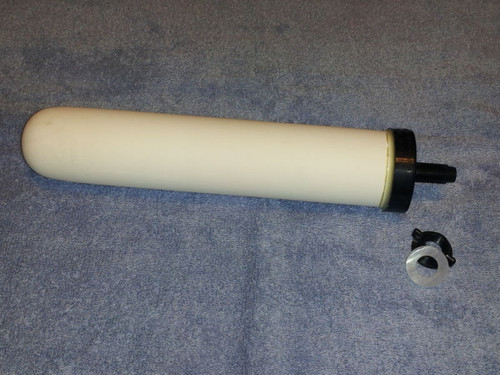Our water filters use a simple, 4 Stage process:
- Washable pre-filter socks catch the largest particles and greatly extend the lives of the encased ceramic filters.
- Ceramic filters made of diatomaceous earth prevent anything larger than 0.7 microns from penetrating the filter when it is new.
- The ceramic contains silver, which is a natural bactericide.
- Encased in the ceramic is high-grade Granular Activated Carbon. GAC has a vast pore structure that has enough surface area to adsorb numerous organic and inorganic compounds and impurities from contaminated water. Activated Carbon is very effective in eliminating unpleasant tastes, odors and color.
Diatomaceous Earth, also known as diatomite,kieselgur, or more commonly known as "DE", is a naturally occurring, soft, siliceous sedimentary rock that is easily crumbled into a fine white to off-white powder. It has a particle size ranging from less than 1 micrometre to more than 1 millimeter, but typically 10 to 200 micrometres. This powder has an abrasive feel, similar to pumice powder, and is very light, due to its high porosity. The typical chemical composition of oven dried Diatomaceous Earth is 80% to 90% silica, with 2% to 4% alumina, and 0.5% to 2% iron oxide.
Diatomaceous Earth consists of fossilized remains of diatoms, a type of hard-shelled algae. It is used as a filtration aid, mild abrasive, mechanical insecticide, absorbent for liquids, cat litter, activator in blood clotting studies, and a stabilizing component of dynamite. As it is also heat-resistant, it can be used as a thermal insulator.
Filtration
The most common use (68%) of diatomaceous earth is as a filter medium. It has a high porosity, because it is composed of microscopically-small, coffin-like, hollow particles. Diatomaceous Earth is used in chemistry as a filtration aid, to filter very fine particles that would otherwise pass through or clog filter paper. It is also used to filter water, particularly in the drinking water treatment process and in fish tanks, and other liquids, such as beer and wine. It can also filter syrups, sugar, and honey without removing or altering the color, taste, or nutritional properties of any of them.
Activated carbon, also called activated charcoal or activated coal, is a form of carbon that has been processed to make it extremely porous and thus to have a very large surface area available for adsorption or chemical reactions.
The word activated in the name is sometimes replaced with active. Due to its high degree of microporosity, just 1 gram of activated carbon has a surface area in excess of 500 m (about one tenth the size of an American football field), as determined typically by nitrogen gas adsorption. Sufficient activation for useful applications may come solely from the high surface area, though further chemical treatment often enhances the adsorbing properties of the material. Activated carbon is usually derived from charcoal.



